It’s no major secret that perfect workplaces are not a thing.
Being expected to be available 24/7, poor communication, bad attitudes coming from both colleagues and leadership, never-ending office drama, no space for growth, work-life imbalance, unreasonable expectations from bosses, microaggressions, developing a habit of thinking about your duties outside of working hours — the list is truly never-ending.
Tackling such things is not easy, as everyone’s conditions are different; but, it’s fair to say that most of us can’t afford to take that final step and wave goodbye to a place that practices such unhealthy dynamics.
Some might learn to live with it; others might fight it. However, sometimes, just sometimes, you get spared, even if it means being sacked 2 hours into your first day.
More info: Reddit | Jim Stroud
You never know, sometimes getting sacked can end up being a blessing in disguise

Image credits: Nataliya Vaitkevich (not the actual photo)
“Fired 2 hours into [a] new job for going off camera for 10 minutes” – this internet user turned to one of Reddit’s most popular groups dedicated to work-related struggles to vent to its members about how they were let go a couple of hours into their call center training. The post managed to garner over 5K upvotes as well as 708 comments discussing the matter.
Person rants about being let go 2 hours into their training for briefly stepping away from the camera

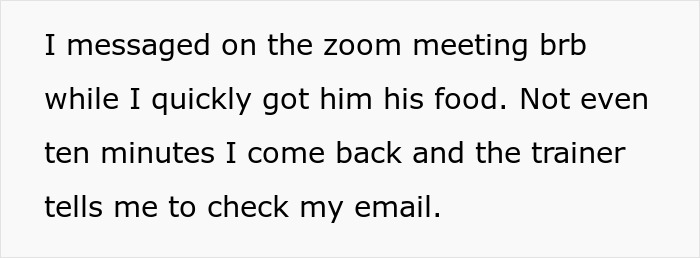
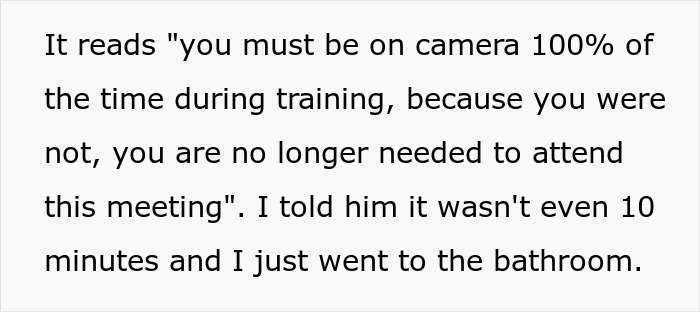
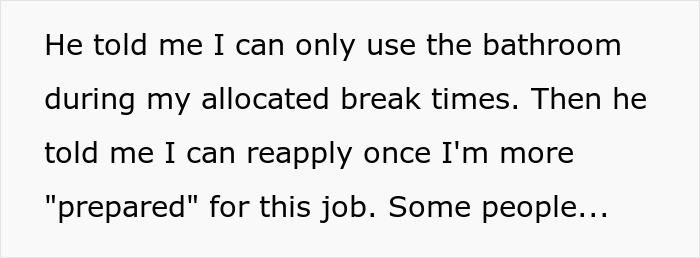
Image credits: After_Ad_2047
The now ex-employee began their post by revealing that it was their first day of training at a work-from-home position at a call center. A couple of hours in, the OP’s father came over to quickly grab some meat they brought him from the store, so before briefly stepping away from the camera, they messaged on the Zoom meeting to let the trainer know they would be right back.
Not even 10 minutes later, the author returned to an email that basically said they must be on camera at all times, and since this hadn’t been fulfilled, they were no longer required to attend the meeting. Naturally, the netizen was puzzled. So, to somehow justify their brief absence and not make it worse, they told the superior that they just went to the bathroom.
However, in return, the higher-up said they’re only allowed to use the bathroom during their designated break times, and as the cherry on top, he also told the Redditor that they could reapply once they were more “prepared” for the job.
A wild situation, isn’t it?

Image credits: Adrian Sampson (not the actual photo)
Unfortunately, Bored Panda was unable to get in touch with the post’s author to obtain any further insight on the story – however, is there a better person to address this issue with than an HR specialist?
We reached out to Jim Stroud and invited him to introduce himself to our readers: “I am a recognized HR Influencer with two decades of experience in the recruitment industry. I have consulted for Microsoft, Google, Siemens, and a host of startup companies. During my tenure with Randstad Sourceright, I alleviated the headaches of Randstad clients worldwide as Global Head of Sourcing and Recruiting Strategy. Quite recently, I served as VP, Marketing for Proactive Talent – the most recognized and respected name in talent attraction, hiring, and retention. Presently, I create content that educates, entertains, and makes you think.”
Then we queried Jim on his opinion on workplaces that uphold such beliefs: “It sounds like this company is new to telecommuting and is finding the change difficult to adapt to. It reminds me of how companies invested big in employee-monitoring systems during the pandemic. Although I was sympathetic to employee monitoring to an extent (guarding against intellectual property theft and security breaches), I think if you hire people you should trust them. I wrote an article on trusting remote workers here, in case you are interested.”
Fellow online community members shared their thoughts and opinions on the situation



“Regarding the firing after 2 hours of work comment, I do not have the testimony of both sides, so I am skeptical of what actually occurred. As such, I have to consider different angles. Did the trainee really say ‘brb’ before leaving? If not, and the Zoom meeting included multiple attendees, the trainer might assume the following red flags:
i) If the trainee cannot follow a simple rule, how likely are they to abide by others? Trust is crucial in a work-from-home job and easy to break. Red flag.
ii) If the trainee cannot respect the time of the trainer, why should the reverse happen? A trainee that cannot respect a trainer’s time suggests that they are entitled, thinking the world revolves around them, and will likely be a problem down the road. Red flag.
iii) Maybe the short time away was at a crucial juncture and to miss that portion would make the remainder of the training obsolete. As such, the trainer would have to repeat a process that everyone else heard, thus wasting everyone else’s time who followed instructions. Red flag.
iv) Maybe repeating that part of the training causes them to go over the allotted time and as a result, the other trainees cannot ask questions that empower them to be more efficient. Red flag,” Jim continued.


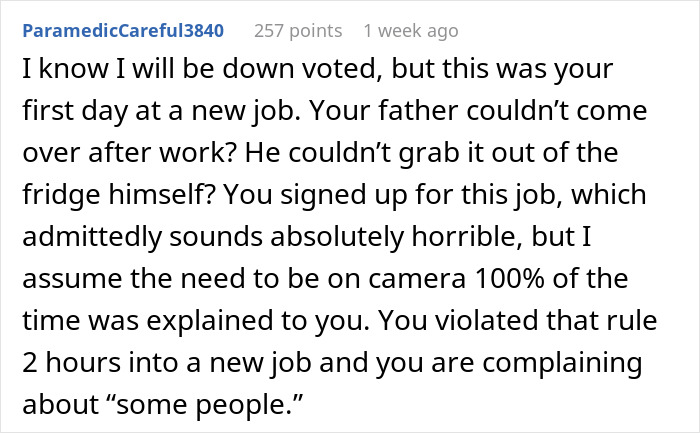
“If this was a Zoom meeting between the two of them…
i) Walking away without excuse or at least alerting the trainer is all the more worse because their absence is all the more noticeable.
ii) All the other reasons I cited above apply, just magnified.
Conversely, if the story is entirely factual, the workplace committed a severe self-inflicted wound. How?
i) It will cost them in vacancies. They damaged their employer brand. If such practices are the norm with this company, they will soon be made public on Glassdoor, social media, and online forums. This will make it more difficult to recruit new workers into the company. And the cost of unfilled jobs can be huge.
ii) It will cost them future business. If someone has a bad experience with a company, why reward them with new or continued business? Doubt me? Virgin Media famously lost $5,000,000.00 (USD) annually because of bad candidate experiences.
iii) It will certainly cost them to replace the worker. How much do call center workers make? For argument’s sake, let’s say $30,000.00 (USD) annually. According to the Center for American Progress, the average cost of replacing someone earning $30,000 was 16% of annual salary. That’s $4,800.00 (USD) for 2 hours of work. Keep firing people for such a flimsy cause and that adds up quickly.”
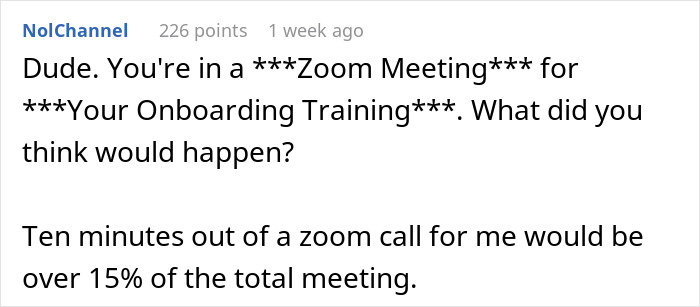

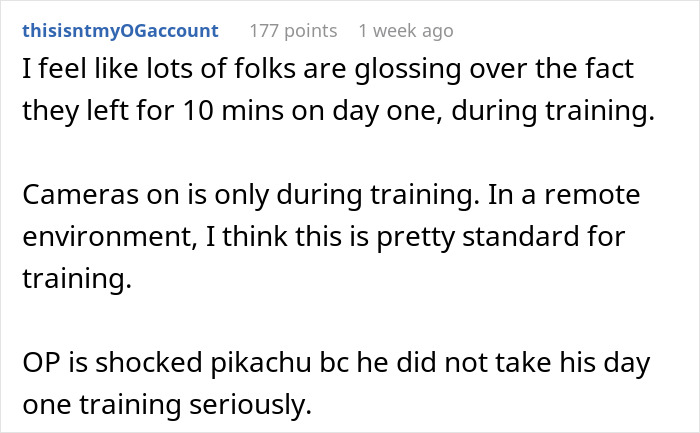
We then asked Jim what a person should do if they find themselves in a similar scenario, and he replied as follows: “Again, I don’t know both sides of the story. However, if the story has not been embellished in any way, then the trainee should be grateful. Why? A few reasons…
i) They saw a bad situation and avoided it on day one, instead of suffering a long, slow, soul-wrenching career decision.
ii) No resume gaps to explain later. Imagine telling a recruiter that you only stayed at Company X for 3 months because of bad management. The recruiter, hearing only your side of the story, would likely be skeptical. Red flag.
iii) They have an opportunity to help someone else avoid a negative situation. Such is the reason websites like Glassdoor were created.”
Last but certainly not least, BP pondered whether Jim had anything else to add: “I read the comments and recognize how easy it is to pile on the employer. I think people take a lot of things for granted and do not consider the plight of the business owner. When an employer hires someone, they take a risk with their entire business. It doesn’t matter if it’s a mom-and-pop or a conglomerate.”
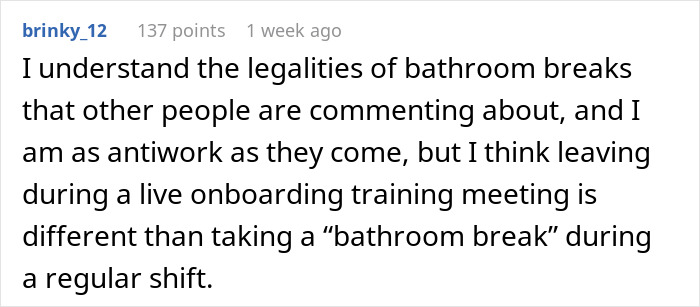
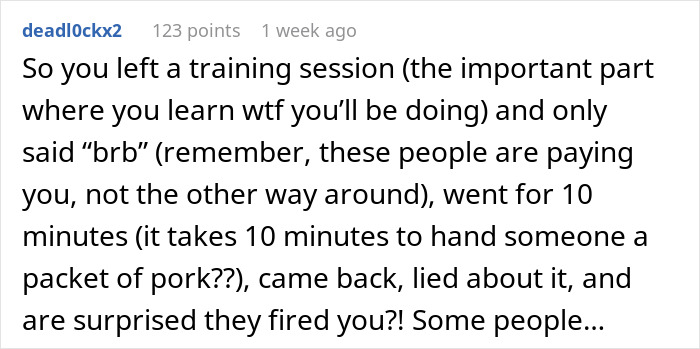

Image credits: Lyn Lomasi (not the actual photo)
“As soon as a candidate becomes an employee, that worker represents a certain level of liability. A few examples…
i) The worker could negatively impact the reputation of the company with shoddy work performance resulting in poorly made products or service. If so, the employer loses business and has to lay people off because they can’t afford to pay salaries.
ii) The worker could treat customers poorly because it’s Tuesday and the worker hates their job. As a result, the company loses business and has to lay people off because they can’t afford to pay salaries.
iii) The worker could do something unseemly that goes viral and gets in the news. At that point, it’s not ‘John Doe sets fire to a car in protest of X,’ it’s ‘ACME worker sets fire to a car in protest of X.’ Now people are paying more attention and ACME gets a demerit on their reputation. Was the protest justified? Did it have anything to do with ACME? Who knows? Who cares? John Doe worked for ACME and that makes it newsworthy.
iv) The worker’s bad attitude affects employee morale, sparking an exodus of talent from the company. And as I mentioned before, replacing workers is expensive.
Bottom line, I don’t know both sides of the story. The trainer could have been a tyrant demanding too much, or he could have been reacting to unreported negative behavior from the trainee. If the trainer was a despot, the damage is done and the company will pay in a number of ways. If the trainee misrepresented things just to virtue signal before sympathetic supporters, it’s likely we will hear more tales of employment woe in the future. If the trainee was indeed unjustly dismissed, they have my sympathies.”
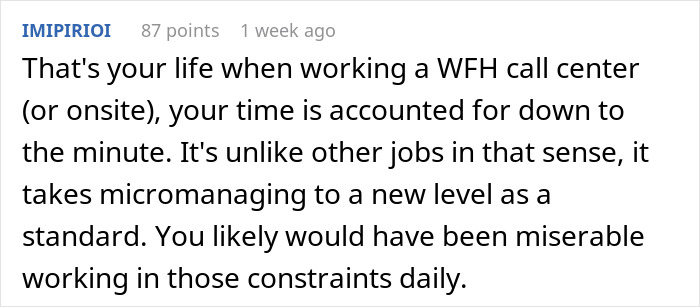
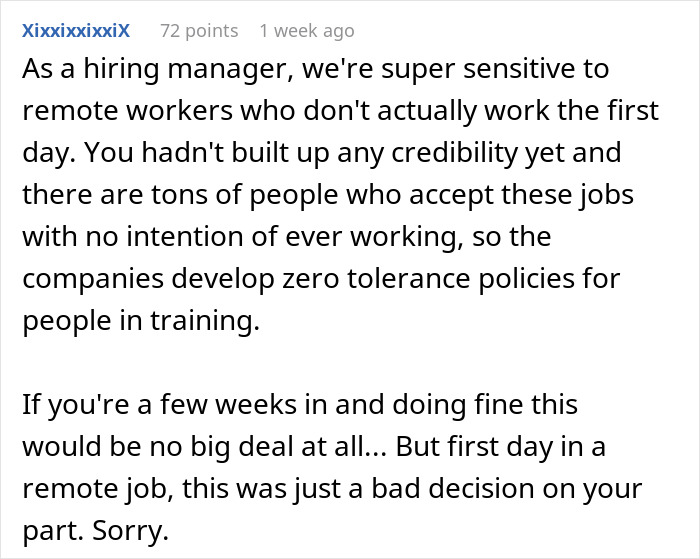







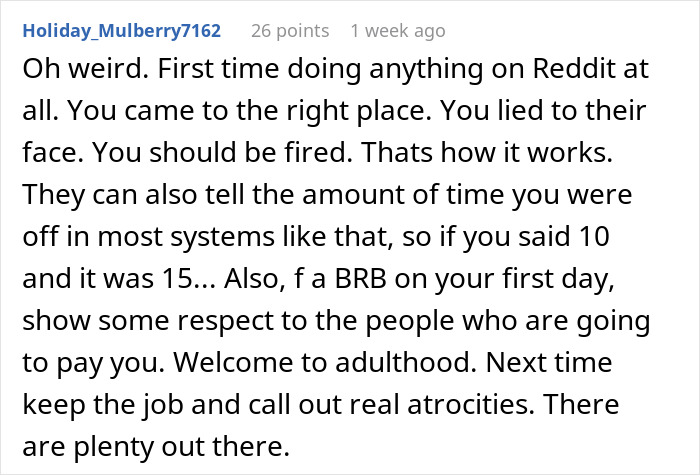


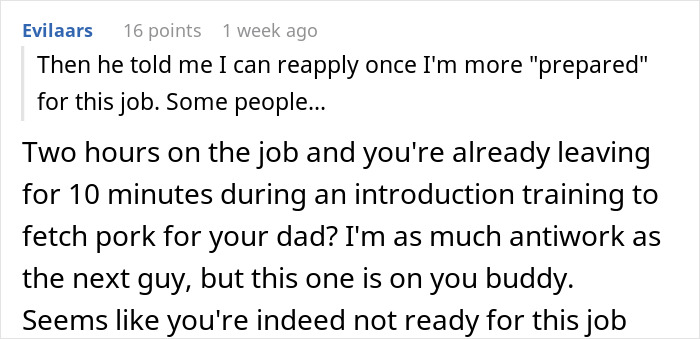
The post “What Did You Think Would Happen?”: Company Fires New Employee After 2 Hours Of Training Because They Went Off Camera For 10 Minutes first appeared on Bored Panda.

